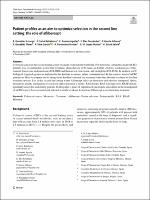| dc.contributor | Vall d'Hebron Barcelona Hospital Campus |
| dc.contributor.author | González Astorga, B. |
| dc.contributor.author | Salva Ballabrera, Francesc |
| dc.contributor.author | Elez Fernandez, Mª Elena |
| dc.contributor.author | García‑Alfonso, P. |
| dc.contributor.author | González Flores, E. |
| dc.contributor.author | Aranda Aguilar, Enrique |
| dc.date.accessioned | 2022-01-24T14:29:20Z |
| dc.date.available | 2022-01-24T14:29:20Z |
| dc.date.issued | 2021-08 |
| dc.identifier.citation | González Astorga B, Salvà Ballabrera F, Aranda Aguilar E, Élez Fernández E, García-Alfonso P, González Flores E, et al. Patient profiles as an aim to optimize selection in the second line setting: the role of aflibercept. Clin Transl Oncol. 2021 Aug;23:1520–1528. |
| dc.identifier.issn | 1699-3055 |
| dc.identifier.uri | https://hdl.handle.net/11351/6884 |
| dc.description | Aflibercept; Colorectal cancer; Patient profile |
| dc.description.abstract | Colorectal cancer is the second leading cause of cancer-related death worldwide. For metastatic colorectal cancer (mCRC) patients, it is recommended, as first-line treatment, chemotherapy (CT) based on doublet cytotoxic combinations of fluorouracil, leucovorin, and irinotecan (FOLFIRI) and fluorouracil, leucovorin, and oxaliplatin (FOLFOX). In addition to CT, biological (targeted agents) are indicated in the first-line treatment, unless contraindicated. In this context, most of mCRC patients are likely to progress and to change from first line to second line treatment when they develop resistance to first-line treatment options. It is in this second line setting where Aflibercept offers an alternative and effective therapeutic option, thought its specific mechanism of action for different patient’s profile: RAS mutant, RAS wild-type (wt), BRAF mutant, potentially resectable and elderly patients. In this paper, a panel of experienced oncologists specialized in the management of mCRC experts have reviewed and selected scientific evidence focused on Aflibercept as an alternative treatment. |
| dc.language.iso | eng |
| dc.publisher | Springer |
| dc.relation.ispartofseries | Clinical and Translational Oncology;23 |
| dc.rights | Attribution 4.0 International |
| dc.rights.uri | http://creativecommons.org/licenses/by/4.0/ |
| dc.source | Scientia |
| dc.subject | Còlon - Càncer - Quimioteràpia |
| dc.subject | Recte - Càncer - Quimioteràpia |
| dc.subject | Quimioteràpia combinada |
| dc.subject.mesh | Colorectal Neoplasms |
| dc.subject.mesh | /drug therapy |
| dc.subject.mesh | Antineoplastic Combined Chemotherapy Protocols |
| dc.subject.mesh | /therapeutic use |
| dc.title | Patient profiles as an aim to optimize selection in the second line setting: the role of aflibercept |
| dc.type | info:eu-repo/semantics/article |
| dc.identifier.doi | 10.1007/s12094-021-02568-y |
| dc.subject.decs | neoplasias colorrectales |
| dc.subject.decs | /farmacoterapia |
| dc.subject.decs | protocolos de quimioterapia antineoplásica combinada |
| dc.subject.decs | /uso terapéutico |
| dc.relation.publishversion | https://doi.org/10.1007/s12094-021-02568-y |
| dc.type.version | info:eu-repo/semantics/publishedVersion |
| dc.audience | Professionals |
| dc.contributor.organismes | Institut Català de la Salut |
| dc.contributor.authoraffiliation | [González Astorga B] Hospital Universitario Clínico San Cecilio, Granada, Spain. [Salvà Ballabrera F, Élez Fernández E] Vall d’Hebron Hospital Universitari, Barcelona, Spain. [Aranda Aguilar E] Hospital Universitario Reina Sofía, Córdoba, Spain. [García-Alfonso P] Hospital General Universitario Gregorio Marañón, Madrid, Spain. [González Flores E] Hospital Universitario Virgen de Las Nieves, Granada, Spain |
| dc.identifier.pmid | 33630242 |
| dc.identifier.wos | 000621755500002 |
| dc.rights.accessrights | info:eu-repo/semantics/openAccess |

